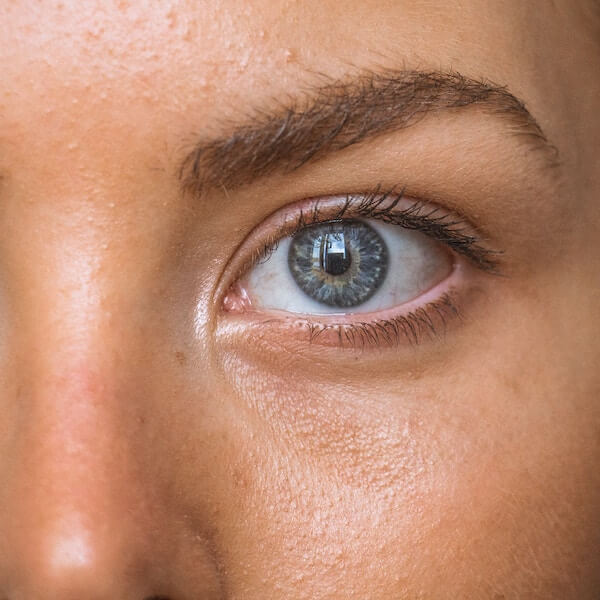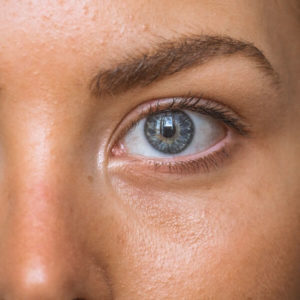Cleanse, tone, moisturize. We’ve been taught this essential 3-step skincare routine all our lives. And it’s really the foundation of healthy skin. What if you’re doing everything right when it comes to what you put on your skin and you still wake up every morning only to see dull, worn-out skin with congestion? Is Your Gut Causing Skin Problems?
If you want to glow from within, you need to focus your attention on not just what goes on your skin, but also what is going on inside your gut!

The Gut-Skin Connection
The simplest way to look at your gut is as an agent to absorb nutrients and to expel toxins. A healthy, functioning gut is able to absorb nutrients from the food we ingest, separating out the unusable waste and toxins that do not serve the body. Keeping these toxins out helps fight inflammation and potential autoimmune disease.
Your gut communicates with different parts of the body, including your skin. Have you ever heard that consuming too many carrots can turn your skin orange? That’s because when you break down and digest carrots, the carotenoids in the carrot get carried to your skin and accumulate, creating an orange tint.
Your gut and skin are covered in beneficial bacteria that help protect you against pathogens. Your gut alone is home to about 300-500 different beneficial bacteria species, and the more diverse these bacteria are, the better. Many issues of digestion can be linked back to a lack of diverse bacteria in the gut.
When digestion is disrupted your entire body is affected.
Potential Causes of Poor Digestion
- Stress
- Consuming a diet high in processed foods, sugar and refined carbohydrates
- Undiscovered food sensitivities
- Too much alcohol
- Too much pasteurized, unfermented dairy products
- Not enough movement and exercise
How to Improve Digestion for Glowing Skin
Eliminate sugar, dairy, soy and gluten.
These are the foods most linked to inflammation in the gastrointestinal tract, and therefore inflammation of the skin. Many people have reported that the elimination of dairy in particular has been beneficial to improving acne, an inflammatory condition.
Follow an elimination diet or low FODMAP diet for 1-2 months and take note of how your gut feels, your digestion performs and how your skin looks. After your elimination period is over, try adding these foods back in one at a time. Gauge how your body accepts these foods. Adding them back in isolation will give you powerful, clear information about how your body handles (or doesn’t handle) these foods.

Exercise
Some form of daily exercise is crucial to helping your digestive process. In a world centered around sitting and hunching over electronics, our digestive organs can get cramped up from being stuck in one position for long periods of time.
Getting your body moving every day is going to help in many ways. Movement itself can help aid the elimination process, helping you go every day. Elevating your heart rate also helps to get nutrients circulating and flushes out toxins. Plus, those endorphins can really help improve your mood and lower your stress levels.
Take Enzymes
Our bodies create our own digestive enzymes which help break down the food we consume. But when our digestive fires are weak, our bodies do not produce enough enzymes to properly break down food. When you supplement with enzymes you are ensuring your food is not only broken down more efficiently, but that the nutrients get absorbed properly and are delivered to your skin! Enzymes can also help your skin’s regenerative process by helping the body renew damaged cells.
Take Probiotics
You’re probably familiar with the benefits of probiotics; they help support the “good” bacteria, support a healthy bowel movement and support a healthy pH level in our gut. All of these benefits support healthy skin by pushing toxins out of our body, allowing the absorption of good nutrients and delivering it to our skin.
But did you know that probiotics also have direct benefits for our skin?
Certain strains of probiotics have shown positive benefits for skin in clinical human studies.
Strains L. acidophilus and L. bulgaricus have shown improvement of inflammatory acne in 80% of those tested. This is significant because we know that taking probiotics orally can reduce inflammation in our gut, but now we have a deeper understanding that those benefits are also translated to our skin.
Strain L. brevis has also shown benefits for moisture and hydration levels in the skin. For those with increased levels of TEWL (transepidermal water loss) on their skin, L. brevis was able to increase the hydration levels of the skin and help the skin retain that water. Skin that retains more water will be naturally bouncy, smooth and glowing with health!
You can find these probiotic strains and digestive enzymes in YouVeda’s My Healthy Digestion formula.
Understanding your body’s gut/skin connection will help you achieve glowing health, inside and out!





